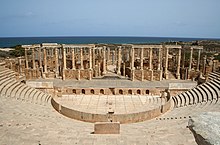
Back الفتح الإسلامي للمغرب Arabic لفتح لإسلامي د شمال إفريقيا ARY فتح المغرب ARZ Арабскае заваяванне Паўночнай Афрыкі Byelorussian Арабско завоюване на Северна Африка Bulgarian মুসলিমদের মাগরেব বিজয় Bengali/Bangla Conquesta musulmana del Magrib Catalan Islámské dobytí Maghrebu Czech Arabische Eroberung des Maghreb German Islama konkero de Magrebo Esperanto
| Muslim conquest of the Maghreb | |||||||||
|---|---|---|---|---|---|---|---|---|---|
| Part of the Arab Conquests and the Arab–Byzantine wars | |||||||||
 Roman Theatre at Leptis Magna | |||||||||
| |||||||||
| Belligerents | |||||||||
|
Rashidun Caliphate Umayyad Caliphate |
Byzantine Empire Kingdom of Altava Kingdom of the Aurès Kabyle confederations[1] Kingdom of Ouarsenis Kingdom of Hodna Various other Berber tribes and statelets Visigothic Kingdom | ||||||||
| Commanders and leaders | |||||||||
|
Amr ibn al-As Abdallah ibn Sa'd Zubayr ibn al-Awwam Abd Allah ibn al-Zubayr Uqba ibn Nafi † Abu al-Muhajir Dinar † Musa ibn Nusayr Hassan ibn al-Nu'man Tariq ibn Ziyad Zuhayr ibn Qays † |
Gregory the Patrician † Dihya † Kusaila † John the Patrician Julian, Count of Ceuta | ||||||||
The Muslim conquest of the Maghreb (Arabic: فَتْحُ اَلْمَغْرِب, romanized: Fath al-Maghrib, lit. 'Conquest of the West') or Arab conquest of North Africa by the Rashidun and Umayyad Caliphates commenced in 647 and concluded in 709, when the Byzantine Empire lost its last remaining strongholds to Caliph Al-Walid I. The North African campaigns were part of the century of rapid early Muslim conquests.
By 642 AD, under Caliph Umar, Arab Muslim forces had taken control of Mesopotamia (638 AD), Syria (641 AD), Egypt (642 AD), and had invaded Armenia (642 AD), all territories previously split between the warring Byzantine and Sasanian empires, and were concluding their conquest of Sasanian Persia with their defeat of the Persian army at the Battle of Nahāvand. It was at this point that Arab military expeditions into North African regions west of Egypt were first launched, continuing for years and furthering the spread of Islam.
In 644 at Medina, Umar was succeeded by Uthman, during whose twelve-year rule Armenia, Cyprus, and all of modern-day Iran, would be added to the expanding Rashidun Caliphate. With Afghanistan and North Africa being targets of major invasions and Muslim sea raids ranging from Rhodes to the southern coasts of the Iberian Peninsula, the Byzantine navy was defeated in the eastern Mediterranean.
- ^ "L'Islamisation du maghreb central (Viie-xie siècle)". Islamisation et arabisation de l'Occident musulman médiéval (Viie-xiie siècle). Bibliothèque historique des pays d'Islam. Éditions de la Sorbonne. 16 October 2015. pp. 103–130. ISBN 9782859448738.